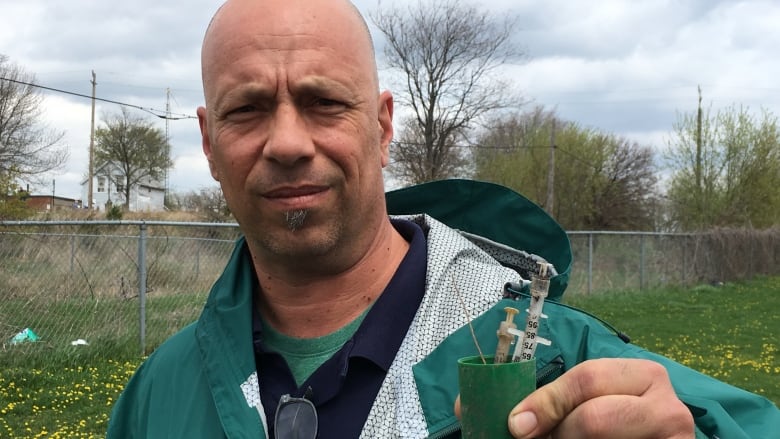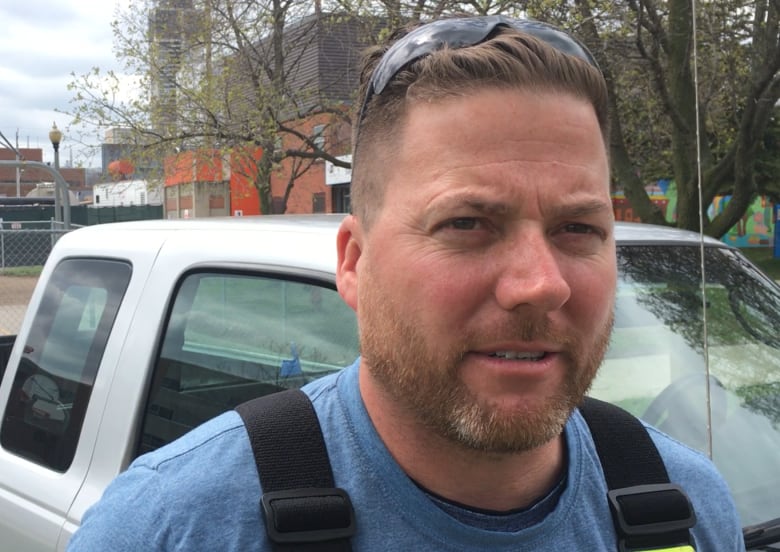Discarded needles pile up in Hamilton parks while city waits for injection site
City finally has a home for a temporary overdose prevention site, but province still needs to sign off

It doesn't take Jason Farr long to find what he's looking for.
The downtown (Ward 2) councillor walks into Jackie Washington Rotary Park, makes a beeline to the fence running along the railroad tracks and gets down on his knees.
"Careful," he cautions. "There's a bunch on the ground here."
Farr is referring to sharps — discarded needles left behind by drug users that litter Hamilton's parks and alleyways.
-
Location found for supervised injection site, now awaiting ministry approval
-
'One death after the other' while search continues for overdose prevention site
Using a scrap of paper pulled from the fence, the downtown councillor carefully picks up a needle and drops it in a green plastic cap he picked up nearby.
"For anybody who thinks this safe injection site is a bad idea, maybe it's bad for business or their neighbourhoods … hopefully they'll see this and get a sense that these unsafe injection sites have existed for some time in the very communities where council has now almost unanimously agreed we need to do something," he said, ahead of a tour to show CBC News some of the places where sharps tend to pile up in Hamilton.
Hope for temporary overdose prevention site
The effort to set up a safe injection site in the city has ramped up in recent months as the rate of opioid-related deaths has continued to climb. Between January and October 2017 there were 70 confirmed and five probable deaths linked to the drugs, compared to 41 during the same period the year before.
In a corner of a park under a tree, there can be piles of them.- Kiley Elliott, Hamilton Parks Dept.
Local agencies have been scrambling to set up a temporary overdose prevention site in advance of a more permanent location.
After weeks of searching, Dr. Jill Wiwcharuk from the Shelter Health Network, said they may have a line on an address, with Hamilton Urban Core CHC at the inner city health centre's 71 Rebecca S. location.
But the deal still isn't done. The group is working to resubmit its application to the province in hopes of securing funding before the writ drops for the provincial election Wednesday and support could be put off by the political process.
'No shortage' of sharps in Hamilton
In the meantime, Farr is on a mission to educate residents about the need for a safe place to use drugs.
The councillor is no stranger to sharps. Farr said he keeps a special disposal container in his office in case he encounters a needle while walking through his ward.
"There is no shortage, unfortunately, [of sharps] in alleyways, dark passages behind some of the buildings right in the heart of our city, and washrooms in public facilities," he said.
"But the most we hear from residents is from moms and dads and grandpas and grandmas who fear for their kids and grandkids in public areas like parks."
The next stop of Farr's tour is Beasley Park, parks staff are scouring the ground with garbage pickers —kids from Dr. Edgar Davey Elementary School want to use the grassy area for gym class later.
Parks worker, Kiley Elliott, said crews are familiar with the trouble areas for sharps in Hamilton's public spaces.
"In a corner of a park under a tree, there can be piles of them," he explained.

The problem can be tough to stay on top of, but tips from the public help.
Crews have special gloves and gear designed to help them safely clean up the needles, but Elliott said pulling out garbage cans still comes with the threat of getting stuck by an unexpected point.
"You always have to be on the lookout."
Community cleanups make a difference
Farr points to Shamrock Park as one place where the work of a neighbourhood association has helped cut down on the number of needles.
There's a berm dotted with trees at the back of the playground. The councillor said he used to find "boatloads and bucketfuls" of needles behind it, but now low branches have been trimmed back and there's nowhere for people to inject out of sight.
"By cleaning up that whole wooded lot and that berm from the top to the bottom, they're making it safer for children to play."
The final stop on Farr's tour is a steep hill just off the Escapement Rail Trail and up to the Claremont Access.
Last summer it was a "tent city," said Farr, with needles "everywhere."
Good news among the garbage
The tents are gone, but some of the sharps remain. Farr picked up five within a few minutes. But among the drug paraphernalia, he also found something positive — wet wipes and plastic wrapping.
It's evidence someone is using the city's needle exchange program.
"Seeing the packaging and seeing these sanitary wipes tells me someone is at least trying to be responsible who has this unfortunate addiction," said Farr.

Despite that bit of good news, the councillor said a supervised injection site is the only thing that will truly care for Hamiltonians with addictions, and help cleanup the city's parks and public spaces.
"From extreme north to extreme south here in Ward 2 there wasn't a location where we didn't observe there's problem," he said. "We already have unsafe injection sites in our community, so why not explore the opportunities to make drug users healthier?"
- MORE HAMILTON NEWS | Music advisory team attempts reboot, hopes to overcome funding issues
- MORE HAMILTON NEWS | Niagara police searching for 'armed and dangerous' stabbing suspect
